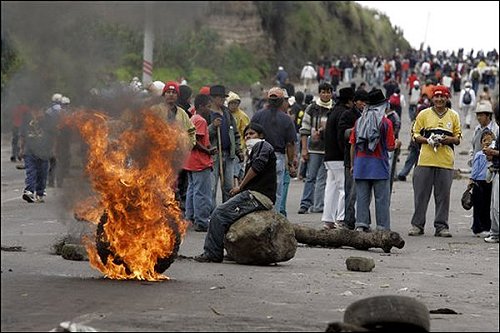Ecuador's Indian Movement Halts Protests
www.washingtonpost.com
By JEANNETH VALDIVIESO | The Associated Press | Friday, March 24, 2006; 3:18 AM

Indigenous people block the Panamericana highway, in Otavalo, north of Quito, Imbabura province, Thursday, March 23, 3006. Protesters and soldiers clashed after President Alfredo Palacio's government declared a state of emergency in four provinces to curb indigenous protests against a proposed free-trade deal with the U.S. (AP Photo/Fernando Vergara) (Fernando Vergara - AP)
QUITO, Ecuador -- Hundreds of Indians started long marches back to their highland villages, halting 11 days of roadblocks and violent demonstrations against Ecuador's free-trade talks with Washington.
Vowing to regroup, the country's powerful Indian movement broke off protests Thursday after police used tear gas against some 300 students and 200 Indians marching on the government palace in the capital, Quito.
Ecuadorean trade negotiators, meanwhile, began a final round of talks in Washington.
"Our decision is to make a strategic retreat," said Santiago De la Cruz, vice president of the left-leaning Confederation of Indigenous Nationalities of Ecuador.
He told The Associated Press the movement would reassemble in its communities "to define new actions ... with much greater radicalism." The protesters have started heading home, he added.
The Indian organization contends that Ecuadorean farmers and small-scale Indian producers would not be able to compete with cheap imports from the United States, where agriculture is heavily subsidized. Supporters say a trade deal would help the nation's exporters and boost the economy. Colombia and Peru have already signed trade deals with the U.S.
President Alfredo Palacio again rejected the Indian confederation's demand that he suspend the trade negotiations and put the proposed deal to a vote in a national referendum.
"First we must finish the negotiations," Palacio said. Only then, he said, would his administration present the deal to the Ecuadoran Congress, "and if the people want a referendum, we will discuss it then."
Several thousand Indians started blockading roads with burning tires, rocks and tree trunks on March 13, tying up traffic and halting commerce across Ecuador's highlands and much of the eastern jungle.
The protests lost much of their momentum after Palacio declared a state of emergency late Tuesday in four highland provinces, giving police and military broad powers to impose curfews and make arrests.
Police spokesman Capt. Juan Zapata said roadways had been cleared throughout the highlands. In Imbabura province, north of Quito, several hundred Indians battled about 400 soldiers trying to clear a blockaded highway.
Eight protesters were arrested for "disturbing public order," Zapata said, adding that one Indian was injured in the leg by shotgun pellets and two soldiers were hurt by hurled rocks.
Jorge De La Torre, an Indian leader from Imbabura, told Radio Quito said six protesters were injured and 10 detained.
ecuador | tlc | www.agp.org